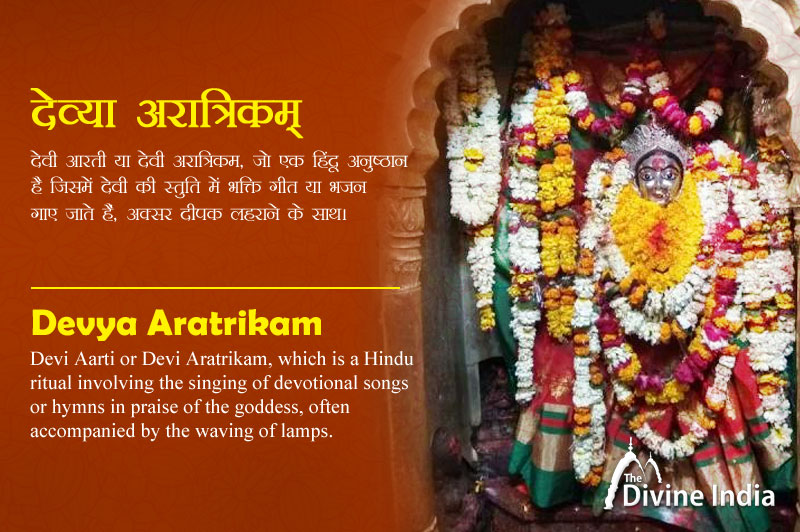


pravarātīranivāsini nigamapratipādye
pārāvāravihāriṇi nārāyaṇi hṛdye।
prapañcasāre jagadādhāre śrīvidye
prapannapālananirate munivṛndārādhye॥
jaya devi jaya devi jaya mohanarūpe।
māmiha janani samuddhara patitaṃ bhavakūpe॥1॥
divyasudhākaravadane kundojjvalaradane
padanakhanirjitamadane madhukaiṭabhakadane।
vikasitapaṅkajanayane pannagapatiśayane
khagapativahane gahane saṅkaṭavanadahane॥
jaya devi jaya devi jaya mohanarūpe।
māmiha janani samuddhara patitaṃ bhavakūpe॥2॥
mañjīrāṅkitacaraṇe maṇimuktābharaṇe
kañcukivastrāvaraṇe vaktrāmbujadharaṇe।
śakrāmayabhayaharaṇe bhūsurasukhakaraṇe
karuṇāṃ kuru me śaraṇe gajanakroddharaṇe॥
jaya devi jaya devi jaya mohanarūpe।
māmiha janani samuddhara patitaṃ bhavakūpe॥3॥
chittvā rāhugrīvāṃ pāsi tvaṃ vibudhān
dadāsi mṛtyumaniṣṭaṃ pīyūṣaṃ vibudhān।
viharasi dānavaṛdvān samare saṃsiddhān
madhvamunīśvaravarade pālaya saṃsiddhān॥
jaya devi jaya devi jaya mohanarūpe।
māmiha janani samuddhara patitaṃ bhavakūpe॥4॥
|| Iti dēvyā ārātrikam samāptam ||
"Devi Aarti" or "Devi Aratrikam," which is a Hindu ritual involving the singing of devotional songs or hymns in praise of the goddess, often accompanied by the waving of lamps. Aarti is a common ritual in Hindu worship, and it is performed to show reverence and gratitude to the deity, seeking their blessings and protection.
During a Devi Aarti, devotees sing bhajans (devotional songs) dedicated to the goddess, expressing their devotion and seeking her blessings. They may also offer incense, flowers, and a lit lamp or diya as a symbol of divine illumination. The aarti is often performed in temples, during festivals, or in homes as part of daily worship.
Each Devi Aarti may be specific to a particular goddess, such as Durga, Lakshmi, Saraswati, or any form of the Divine Mother, and the lyrics of the aarti typically praise her attributes, qualities, and blessings.
The singing of a Devi Aarti is a beautiful and spiritually uplifting practice that allows devotees to connect with the goddess and express their love and devotion. It is a symbol of the enduring belief in the divine feminine energy and the deep reverence for the motherly aspect of God in Hindu culture.